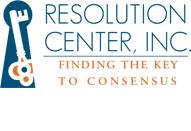F.A.Q.
We've listed answers to questions we're most frequently asked. If you don't see the answer to your question, please contact us.
- What is mediation?
Mediation is a way of handling conflict in which two or more parties agree to meet with an impartial third party to assist in trying to resolve their dispute in a way that is agreeable to all. The mediation process is voluntary and mediators keep the session confidential.
- Why choose mediation?
Fast...
Mediations can usually be scheduled within three weeks of referral.
Convenient...
Mediations are arranged during the day at a time that is convenient for both parties.
Less stressful...
Mediators provide a neutral, informal setting.
Confidential...
The mediation takes place in a private setting. Only involved parties attend the session.
Free...
There is no charge for mediation with the WCRC for the first 3 hours, if you qualify.
Self-determined...
You decide how your dispute will be resolved, without a judge or jury.
- Should we be embarrassed about needing/using mediation?
Absolutely not. Yet, this is a very common reaction. Sometimes it is necessary to have a third-party assist with new ways of looking at the dispute, communication tools, and facilitation skills to assist in the resolution of the conflict. The Resolution Center has assisted thousands of people to resolve their disputes that they were not able to resolve on their own. Let us assist you today!
- What mediation is not
Mediation is neither meditation nor medication! Joking aside, mediation is not a court hearing. Usually, neither lawyers nor witnesses are needed. Mediation is not a process to determine guilt or innocence. It is a way for people in conflict to reach their own agreement; one that they think is best for them.
- What types of cases are right for mediation?
Almost any type of case can be helped through the process of mediation. For information about some common types of cases we handle at the Resolution Center, check out the Mediation page.
- What is a mediator?
A mediator is a neutral third-party who helps people resolve their differences. Mediators are neutral. They do not take sides. They do not decide right or wrong. They do not force people into an agreement. Mediators are trained to listen to all sides and assist the parties in considering alternatives which can lead to an agreement. The mediator does not make decisions for the parties. At the Resolution Center we utilize highly-trained volunteer mediators.
- What happens during a mediation session?
Mediation sessions are informal, structured discussions. Each party is given the opportunity to speak without interruption. The mediator will then structure the discussion to help people clarify the issues and move toward an agreement. That agreement is then written down and signed by each party and the mediator. A copy is given to each party.
- What should I do before a mediation session?
Before participating in the mediation session, think about possible compromises or solutions to the problem - but do not become set on one. Decide what you want from the other party and what you would be willing to give in return. This may be facilitated by creating a list (of property to be divided, of debts to discuss, of charges unpaid, etc.) and bringing that to mediation. Most importantly, be ready to come to mediation with an open mind, and the willingness to negotiate (to give and take).
- How do I become a mediator?
At the Resolution Center, all of our mediators are highly trained and vetted prior to mediating cases. When hiring a private mediator, there is no requirement for training or experience prior to performing a mediation. However, the Wisconsin Association of Mediators has developed a Model Guide for Mediation Training, based on the 40-hour Mediation Skills Training offered by Resolution Center, Inc. The Model Standards of Conduct for Mediators (PDF) require training prior to serving as a mediator.
- How do I become a "certified" mediator?
Currently, Wisconsin does not certify mediators. To meet the requirements of other certifying bodies (e.g. mediate.com, State of Florida, etc.) please look to their individual requirements. Resolution Center, Inc.'s 40-hour mediation training meets the standards of nearly all certifying bodies and served as the model for the Wisconsin Association of Mediators to develop its Model Standards for Basic Mediation Training.
- Does this training qualify under §767.405?
Wisconsin Statute §767.405 only applies to mediators who will become employed (or independently contracted) by a Wisconsin county to provide mediation services in placement or custody cases under Wisconsin Chapter §767. Privately contracted mediators in Wisconsin do not have any specific training or experience requirements. Resolution Center, Inc. is an expert in the training of mediators to raise the professional practice of mediation in Wisconsin.
If you are in need of a training that satisfies §767.405 requirements, the WCRC training meets all of those requirements, except the specialized discussion of the effects of domestic violence on mediation. All WCRC mediators have received supplemental training in this topic.
